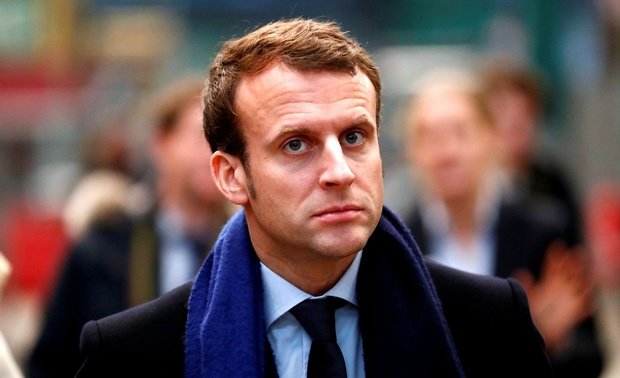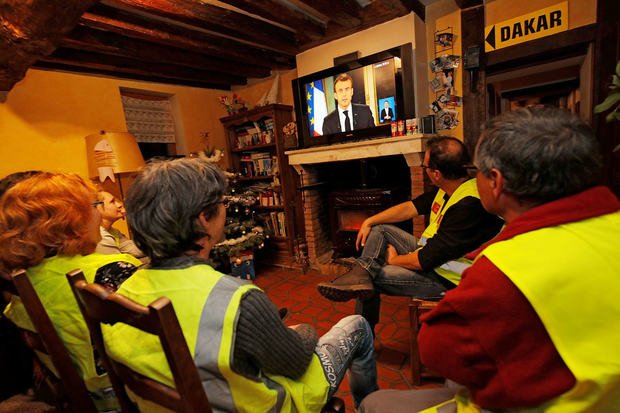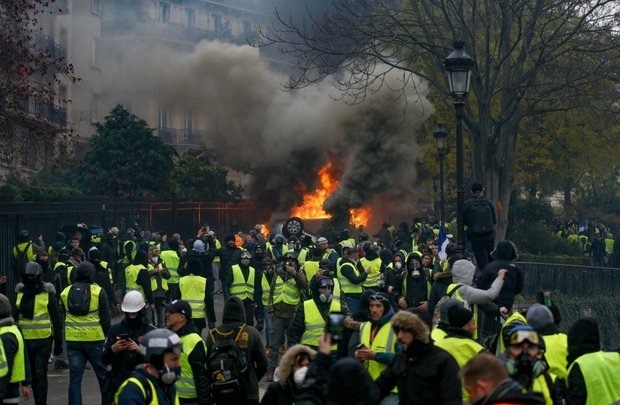''Many French believe that there is no justice in the country, and Macron is the president of the rich''
Sergey Fedorov — about the bad French tradition when adequate protesters are joined by left and right radicals
Emmanuel Macron has started the right reforms, but his trouble is that they are difficult to understand for the Frenchman living in remote places. This has provoked protests with violence and vandalism, which had not been in the country for a long time, says Candidate of Political Sciences, expert on foreign and domestic policy of France Sergey Fedorov. In the interview with Realnoe Vremya the expert says what is the difference between the events of 1968 and the current ones, whether the ''state of emergency'' will help to bring down the protest degree and whether the current president of France is weak as the head of the state.
''If in 1968 young people did not know what to do at the end of the day, the current protesters do not know how to make it to the end of the month''
Mr. Fedorov, some are already beginning to compare the French protests against fuel taxes with the protests of 1968. Is this comparison appropriate?
It is appropriate in terms of the scale of violence, fights with the police, that is, the elements of the uprising we are observing in Paris and other cities. But common things of 1968 and 2018 end on this. As a French journalist wittily noted, if young people in 1968 did not know what to do at the end of the day (the same boys were not allowed to girls in their dormitory), the current protestants do not know how to make it to the end of the month — due to the lack of livelihood. This is the fundamental difference between the current protests and the ones half a century ago.
Let's remember: the events of 1968 began with the protests of students who demanded more freedoms, democracy, less authoritarian rule, which for them was personified by de Gaulle — a man from the past, and the sexual revolution and everything else was mixed with politics. Now the situation is completely different. Who are these people who came out to protest in the streets? This is the lower layer of the middle class of France, people from the provinces who are dissatisfied with their financial situation, dissatisfied with life, which is not improving. If earlier the French media, sociologists, politicians paid attention only to the problems of migrants, coloured people, ''difficult neighbourhoods'', which from time to time raged, now it has turned out that there is another France — which has been forgotten. That is, native France, living in the province. The province is suffering because enterprises are closed, health care, infrastructure deteriorates, salaries are barely enough until the end of the month, and the French feel abandoned and do not understand what will happen next. Well, the government's planned a 23 per cent increase in tax on motor fuel, as well as on gas, electricity and car inspection just have blown up the situation and became the thing that overtaxed patience that, by the way, has been accumulating in France for several decades. This is not Macron who has come and for a year and a half has been bringing the situation to a dead end! Of course, the president has contributed to this, but the discontent has been accumulating for decades and is now out. It has turned out to be not organized (by trade unions or parties), but initiated by the masses with the help of social networks.
Is it still an economic protest or already political one?
Everything quickly moved on to political demands — the resignation of Macron, to the discontent with the entire socio-economic policy pursued by the government, but in addition, the protesters began to talk about changes in the constitution, that is primarily about the introduction of provisions on the possibility of a popular referendum, direct democracy like in Switzerland. Therefore, now the requirements are already developing into a political format.

''I think that Macron is a strong president because he has the will, he is aimed at reforming France, and he has courage, enthusiasm, energy. At the same time, Macron is very young to be president and he does not have enough life experience that more mature French political leaders had.'' Photo: panorama.pub
Are the introduction of the ''state of emergency'' and a number of concessions of Macron able to neutralize the political demands?
Macron expects that he will reduce the degree of tension through the introduction of a state of emergency. Perhaps it will be so. But it is a fact that the 13-minute address of the president to the nation did not satisfy or reassure most of the yellow vests. All interviews, which are now broadcasted on different channels of French television, show that not everyone is satisfied. Although the measures announced by Macron are very significant and worth about 10-15 billion euros, one should not count on a decline in protests. Because, it seems that next weekend the French will again take to the streets.
''The reforms are right, but they are difficult to understand for the Frenchman living in remote places. He has other problems''
Why were the problems of the French province not solved by the previous presidents? What was the reason?
Partly they solved the problems, but it was hard for them to carry out structural reforms, unlike their colleagues in other EU countries. The Germans managed to carry out pension reform, the reform of labour legislation under Schröder and were able to get out of the crisis that occurred in 2008, but the French did not. That is why the economy began to grow poorly, unemployment reached 10 per cent of the economically active population of France (the Germans — 4 per cent), and among young people under 25 years 25 per cent are unemployed (here the reason is that the Germans managed to build a system of vocational education quite effectively, but the French — no). Problems piled up, and although Nicolas Sarkozy tried to solve them, but he was prevented by the crisis of 2008. The fact that Macron carried out the reform of labour legislation, reform of railways (he began their privatization because of a huge public debt of roads), the fact that he began the reform of higher education (more rigorous selection of students in universities due to overcrowding of universities and unsatisfactory grades of students) and secondary education (teaching children when aged not six, but three years) — all this is aimed at modernizing the French economy and society. But not everyone can withstand these reforms, and there are many claims to the government, which missed a lot. Macron's reforms are right, but they are difficult to understand for the Frenchman who lives in remote areas — he has a few other problems than the French political elite does.
Or maybe the reforms were hampered by the fact that France was constantly shaken by protests — of trade unions, students, and the government was forced to meet them halfway?
Of course. Each country has its own specific political culture, and the French in this regard are very ardent people. They explode at almost every reason, and every French government endures no more than 15 months, as Francois Fillon said (French Prime Minister under President Nicolas Sarkozy – editor's note). The French are people with a protest nature, they are all ready to question and discontent, and in addition, most of the French remain adherents of the left ideology (no wonder socialism appeared in France), so the protest movement erupts quickly. The protests were always — under Chirac and Sarkozy, and Hollande, but the protests of such a scale, violence and vandalism had not occurred a very long time.
''These events will be a fundamental turning point in the presidential mandate of Macron''
If we talk specifically about Emmanuel Macron — is he a strong or weak president in the French history?
Everything is relative, and it is very difficult to rank which of the French leaders was stronger and who was weaker. But I think that Macron is a strong president because he has the will, he is aimed at reforming France, and he has enough courage, enthusiasm, energy. At the same time, Macron is very young to be president and he does not have the life experience that more mature French political leaders had. Yes, he has a wonderful education, he was a banker, went to the ''top'', but he had little to do with the real life of the French. He himself admits that there is a gap between the French political elite and ordinary people and that this gap has been deepening. When there is property inequality, status inequality, it is dangerous for any state — especially if there are social explosions.
I think that Macron is a capable and talented president, but it is a fact that these events will be a fundamental turning point in his presidential mandate. It will take a lot of effort to change the situation for the better, at least to reassure the population, which, apparently, will be very difficult. Well, in addition, Macron will need to make a strong leaning to the left in terms of social reforms, taking into account the discontent of the population.

''Macron's reforms are right, but they are difficult to understand for the Frenchman who lives in remote areas — he has a few other problems than the French political elite does.'' Photo: ideologs.com
What does the state of social and economic emergency mean for France? Macron's measures — a six-month deferred increase in taxes on gasoline, an increase in the minimum wage of 100 euros, payment of overtime without tax, have already been approved by many French, but what is the benefit of the state of emergency?
I will say that this situation in France should not be taken as a curfew, the military on the streets and the like. ''The state of emergency'' is a certain figure of speech, which means that the government will urgently carry out various activities and consultations with local authorities, with the mayors of cities, with trade unions, non-governmental organizations and other social movements to develop a social contract to, as the French say, come to an agreement on the fundamental moments of French society. These consultations will concern both social policy and economic, but mainly financial and tax policy. Because many French are now inclined to believe that there is no social justice around, that Macron is the president of the rich and he cares only about them, while other layers should live by the principle of ''survive as you can''.
Therefore, the state of emergency should be understood as the need to take urgent measures to bring the country out of the crisis. Although Macron in his address said that the government would dramatically suppress the anti-republican antics of the rioters and arrest those who provoke looting and so on. Here the government is determined. And it would be strange if the state did not say that its first concern was order.
Why do you think the protest was not peaceful? Is it typical?
Yes, there is a bad tradition in France, when adequate people, and among the current protesters there are a lot of pensioners, are mixed with left and right radicals in the same yellow vests and begin to smash everything that gets in their way — ATMs, shops.
How does the non-protesting population of France treat the ''provincials''? With understanding?
Not only with understanding, but also with sympathy — 75 per cent of the French support the requirements of the yellow vests, understand their anxiety and resentment. But I don't think these people support extremists robbing stores.
''This is network protests, but social networks has no leaders, which could be relied on in negotiations''
You said that the lower classes of the middle class are taking part in the current protests. There is an opinion that it is the protest of the middle class (as it was in Ukraine, Armenia, Yugoslavia, Georgia) that invariably leads to a change of power and course. Is it possible in France, the country with more than a century-long democracy?
The French state, and especially the constitutional and political structure of France, which is already 60 years old, is quite strong. France is a presidential-parliamentary republic, where the president has very broad powers. If we assume that events develop in the worst case scenario, it always has the opportunity to pull out strong trumps. For example, the president will decide to dismiss the government and change the course. This, incidentally, had already happened before in France (the president was on Olympus and used the prime minister as a shield or scapegoat), and this option Macron has now. There is an even stronger measure that can reduce the intensity of passions — early elections to the lower house of the parliament, but it is possible only if there is a threat to public order and institutions of the republic. But Macron still has the reserves not to make the situation become catastrophic.

''Macron in his address noted that the government would sharply suppress the anti-republican antics of the rioters and detain those who provoke robberies and so on. Here the government is determined.'' Photo: delfi.ee
Does the French society need a lot of time to reach the very agreement that is necessary in the current situation of the social contract?
It is difficult to expect that this agreement will be reached in a week. The main thing is that all these protests could be translated into the format of negotiations, although it is very difficult — because the yellow vests do not have leaders and organizers as such. Because it is network protests, and in social networks there are no leaders on whom it would be possible to rely in negotiations (though there have appeared the groups which have contacted with the government). Therefore it will take several months to reach agreement if all stakeholders and sectors of society are involved. By the way, this form of discussion is a flaw of Macron, he neglected such forms of governance or, so to speak, forms of policy coordination, preferring the vertical of power. Which did not bring him dividends, but rather aggravated the situation and questioned the course of the planned reforms.